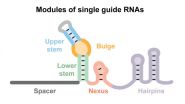(Press-News.org) personalised nutrition based on an individual's genotype - nutrigenomics - could have a major impact on reducing lifestyle-linked diseases such as obesity, heart disease and Type II diabetes
a study of more than 9,000 volunteers reveals strict regulations need to be put in place before nutrigenomics becomes publicly acceptable due to people's fears around personal data protection
led by Newcastle University, UK, and involving experts from the universities of Ulster, Bradford, Porto (Portugal) and Wageningen (Netherlands), the study is the first to assess consumer acceptance of personalised nutrition
Personalised diet plans will not be widely accepted by the public until regulations are in place to protect information about our DNA, new research has shown.
Led by Newcastle University, the Food4Me project is a €9 million EU project investigating the potential of nutrigenomics - a relatively new branch of nutrition which looks at how the food we eat affects the behaviour of our genes.
Using DNA, experts are able to look at not just the usual factors such as age, sex, BMI and physical activity, but also the way in which each individual's genes interact with the food we eat. This in turn enables them to create a bespoke nutrition plan.
Research is on-going, but early indicators suggest the technology could offer a vital tool in the fight against various lifestyle-linked diseases such as obesity, heart disease and Type II diabetes.
However, a study by the Newcastle-led team and published today in the online journal PLOS ONE, suggests that despite the potential benefits of nutrigenomics, people's reluctance to hand over personal data is likely to prevent widespread uptake of the system.
Study lead Professor Lynn Frewer, Professor of Food & Society in the School of Agriculture, Food and Rural Development at Newcastle University, explains: "There's an assumption in many communities that people are risk averse to food technologies such as GM and nutrigenomics.
"But actually, we found the opposite. The people we questioned could really see the benefits of this approach but said they were yet to be convinced that it would be worth the risk of handing over data about their DNA.
"Nutrigenomics has the potential to be the next big thing in our fight against lifestyle-linked diseases, particularly if it becomes available on the NHS."
Poor nutrition contributes to the incidence of many diseases. It has been estimated that approximately 80% of cases of cardiac disease, stroke, Type II diabetes and 40% of cancers could be avoided through improved lifestyle, including those related to diet.
Above and beyond this, an individual's predisposition to certain diseases based on genetic variation will also play a major role and in turn influence what constitutes an 'optimal diet'.
The mapping of the human genome in 2000 introduced the possibility of individualised medicine, including personalised nutrition and the field of "nutrigenomics" emerged - examining the relationship between food and gene expression.
Questioning 9,381 participants from nine European countries (Germany, Greece, Ireland, Poland, Portugal, Spain, the Netherlands, Norway, and the UK) the team were able to investigate the psychological factors influencing people's willingness to adopt a personalised diet plan.
They found protection of consumers' genetic data was a key limiting factor, particularly as there are only a handful of companies currently offering the service and these are run on a commercial basis.
"Guidelines around fat, sugar, alcohol and other foods are based on averages and they work very well - but they are just a guide," explains Professor Frewer.
"The problem is that we are all unique so, for example, one woman's ability to metabolise sugar might be wildly different from another's, even though on the outside they are both 50 years old, of similar height and weight and exercise regularly.
"The difference is in their genes and with nutrigenomics we can start to delve down into these differences and tailor dietary plans for the individual. It's incredibly exciting but we need to get the regulations in place first if it is going to make an impact on public health."
INFORMATION:
More information can be found at: http://www.food4me.org/
EUGENE, Ore. -- Oct. 21, 2014 -- University of Oregon chemists have devised a way to see the internal structures of electronic waves trapped in carbon nanotubes by external electrostatic charges.
Carbon nanotubes have been touted as exceptional materials with unique properties that allow for extremely efficient charge and energy transport, with the potential to open the way for new, more efficient types of electronic and photovoltaic devices. However, these traps, or defects, in ultra-thin nanotubes can compromise their effectiveness.
Using a specially built microscope ...
MADISON, Wis. — As Dane County begins the long slide into winter and the days become frostier this fall, three spots stake their claim as the chilliest in the area.
One is a cornfield in a broad valley and two are wetlands. In contrast, the isthmus makes an island — an urban heat island.
In a new study published this month in the Journal of Applied Meteorology and Climatology, University of Wisconsin-Madison researchers highlight the urban heat island effect in Madison: The city's concentrated asphalt, brick and concrete lead to higher temperatures than ...
BETHESDA, MD – Age-related loss of the Y chromosome (LOY) from blood cells, a frequent occurrence among elderly men, is associated with elevated risk of various cancers and earlier death, according to research presented at the American Society of Human Genetics (ASHG) 2014 Annual Meeting in San Diego.
This finding could help explain why men tend to have a shorter life span and higher rates of sex-unspecific cancers than women, who do not have a Y chromosome, said Lars Forsberg, PhD, lead author of the study and a geneticist at Uppsala University in Sweden.
LOY, ...
(Philadelphia, PA) – Chest pain doesn't necessarily come from the heart. An estimated 200,000 Americans each year experience non-cardiac chest pain, which in addition to pain can involve painful swallowing, discomfort and anxiety. Non-cardiac chest pain can be frightening for patients and result in visits to the emergency room because the painful symptoms, while often originating in the esophagus, can mimic a heart attack. Current treatment — which includes pain modulators such as selective serotonin reuptake inhibitors (SSRI) — has a partial 40 to 50 ...
Customized genome editing – the ability to edit desired DNA sequences to add, delete, activate or suppress specific genes – has major potential for application in medicine, biotechnology, food and agriculture.
Now, in a paper published in Molecular Cell, North Carolina State University researchers and colleagues examine six key molecular elements that help drive this genome editing system, which is known as CRISPR-Cas.
NC State's Dr. Rodolphe Barrangou, an associate professor of food, bioprocessing and nutrition sciences, and Dr. Chase Beisel, an assistant ...
A longstanding question among scientists is whether evolution is predictable. A team of researchers from UC Santa Barbara may have found a preliminary answer. The genetic underpinnings of complex traits in cephalopods may in fact be predictable because they evolved in the same way in two distinct species of squid.
Last, year, UCSB professor Todd Oakley and then-Ph.D. student Sabrina Pankey profiled bioluminescent organs in two species of squid and found that while they evolved separately, they did so in a remarkably similar manner. Their findings are published today in ...
Research in recent years has shown that people associate specific facial traits with an individual's personality. For instance, people consistently rate faces that appear more feminine or that naturally appear happy as looking more trustworthy. In addition to trustworthiness, people also consistently associate competence, dominance, and friendliness with specific facial traits. According to an article published by Cell Press on October 21st in Trends in Cognitive Sciences, people rely on these subtle and arbitrary facial traits to make important decisions, from voting for ...
(SALT LAKE CITY)—Workers punching in for the graveyard shift may be better off not eating high-iron foods at night so they don't disrupt the circadian clock in their livers.
Disrupted circadian clocks, researchers believe, are the reason that shift workers experience higher incidences of type 2 diabetes, obesity and cancer. The body's primary circadian clock, which regulates sleep and eating, is in the brain. But other body tissues also have circadian clocks, including the liver, which regulates blood glucose levels.
In a new study in Diabetes online, University ...
DURHAM, N.H. –- Crewed missions to Mars remain an essential goal for NASA, but scientists are only now beginning to understand and characterize the radiation hazards that could make such ventures risky, concludes a new paper by University of New Hampshire scientists.
In a paper published online in the journal Space Weather, associate professor Nathan Schwadron of the UNH Institute for the Study of Earth, Oceans, and Space (EOS) and the department of physics says that due to a highly abnormal and extended lack of solar activity, the solar wind is exhibiting extremely ...
DURHAM, N.H. – Six percent of U.S. children and youth missed a day of school over the course of a year because they were the victim of violence or abuse at school. This was a major finding of a study on school safety by University of New Hampshire researchers published this month in the Journal of School Violence.
"This study really highlights the way school violence can interfere with learning," says lead author David Finkelhor, professor of sociology and director of the Crimes Against Children Research Center (CCRC) at UNH. "Too many kids are missing school ...





